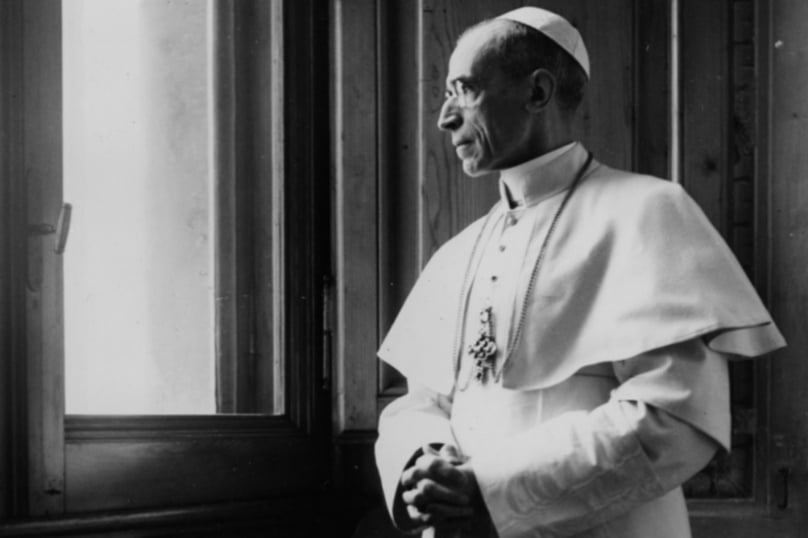
The great Piazza San Pietro is a five-minute walk from where I’m living during Synod 2015.
About three-quarters of the square is bounded by the famous Bernini colonnades, which reach out from the Vatican basilica as if to embrace the world.
Along the open “front” of the piazza and along the perimeter of the colonnades, a broad white stripe is embedded in the street. The casual visitor might mistake it for a kind of “No Parking” sign.
In fact, that white strip marks the border between Vatican City State and Italy.
And, for many during World War II, it signified the boundary between life and internment, imprisonment or death.
When Italy declared war on the Allies – after the initial, swift success of the German invasion of the Low Countries and France seemed to suggest who was going to win World War II – Allied diplomats accredited to the Holy See but living in Rome fled into the Vatican and were housed there throughout the war. So did democratically-minded Italians on Mussolini’s hit list – like Alcide de Gasperi, who would become Italy’s first post-war Christian Democratic prime minister.
Another boundary of consequence was defined by the walls surrounding the papal villa at Castel Gandolfo.
Thousands of Italian Jews were hidden there, and dozens of babies were born in Pope Pius XII’s bedroom, some of them given the names “Eugenio” or “Eugenia” in honor of the pontiff who saved their parents’s lives.
These facts of Pius’s actions, like his quiet orders to hide Roman Jews in Catholic facilities, are reasonably well-known, if often ignored in the polemics that surround the debate over Pius XII’s and the Holy See’s actions (or inactions, or silences) during the war.
A new book by intelligence specialist Mark Riebling, Church of Spies: The Pope’s Secret War Against Hitler (Basic Books), adds a mass of new evidence to what we know about what the pope and the Church did to deal with the mortal threat to civilisation posed by Hitler and German National Socialism.
In a word: Pius was complicit in a variety of plots, initiated by patriotic, anti-Nazi Germans, to assassinate Hitler and replace the Nazi regime with a government that would make peace with the West.
That Pius was involved in at least one such plot has been known for decades, thanks to Owen Chadwick’s Britain and the Vatican During the Second World War, which drew extensively on the records of Great Britain’s representative to the Holy See during the war, D’Arcy Osborne.
Church of Spies, which is based on exhaustive archival research (including a close reading of the Nuremberg trial transcripts), demonstrates that the plot mentioned in Chadwick’s book was not the only such enterprise, and that Pius XII’s closest aide, Fr Robert Leiber, SJ, was the key liaison between the Pope and the various plotters, working in discrete tandem with a German Catholic lawyer, Dr Josef Mueller.
None of these multiple attempts to eliminate Hitler and replace the Nazi regime got to the trigger-point, with the exception of the Stauffenberg plot (cinematically memorialised in Valkyrie).
And it has long been known that many German officers refused to participate in such plots because of their personal oath of loyalty to Hitler; they may have detested him, but they had sworn to uphold him.
Riebling shows that another difficulty in gathering sufficient manpower behind any plot was the difference between Catholic and Protestant German generals: the Catholics, tutored by Thomas Aquinas, had a theological rationale for morally defensible tyrannicide, while the Protestants, mired in a Lutheran theory of state authority, had no such moral
compass; quite the opposite, in fact.
Church of Spies does not, and cannot, settle the question of whether Pius should have spoken out plainly and unmistakably in condemnation of the Holocaust; that he refrained from doing so
because he thought that would intensify the murderous bloodletting of the Third Reich seems well-established, if unlikely to persuade all of the wisdom of the course he chose.
But Church of Spies ought to end the “Hitler’s Pope” nonsense.
“Hitler’s Pope” would not have aided and abetted plots to kill Hitler.
